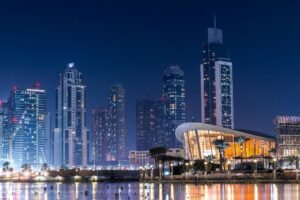Explore Japan’s futuristic smart cities that integrate advanced technology, sustainability, and innovation. Discover how these cities are shaping the future of urban living.
Introduction:
Japan is at the forefront of technological advancements, and its smart cities are a testament to this innovation. Combining artificial intelligence, sustainable energy, and digital connectivity, Japan is transforming urban living. These smart cities prioritize efficiency, environmental responsibility, and convenience to create an improved quality of life for residents. This blog provides insight into Japan’s leading smart cities and how they are revolutionizing modern living.

1. Tokyo
The Pioneer of Smart City Innovations Tokyo is a leader in smart city initiatives, utilizing AI-driven infrastructure, autonomous transport, and digital solutions. The city’s 5G network enhances connectivity, while its advanced public transportation system integrates real-time data for smooth travel. Tokyo’s urban planning also incorporates smart buildings with energy-efficient systems, promoting sustainability in the metropolis.
2. Fujisawa Sustainable Smart Town
Fujisawa, developed by Panasonic, is a model smart town designed for environmental sustainability. It runs on renewable energy sources, including solar power, and incorporates smart grids for efficient energy use. The town’s homes are equipped with IoT technology that optimizes energy consumption, while shared mobility solutions reduce carbon footprints. Fujisawa sets a benchmark for eco-friendly urban living.

3. Kashiwa-no-ha
A Smart City with a Green Vision Kashiwa-no-ha, located near Tokyo, is a smart city that balances technology with environmental conservation. The city utilizes an intelligent energy management system that ensures stable power supply and reduces energy waste. Public spaces are designed to enhance community interaction, and AI-based health monitoring systems contribute to residents’ well-being. Kashiwa-no-ha is an example of how smart cities can prioritize both technology and sustainability.
4. Woven City
Toyota’s Experimental Smart City Toyota’s Woven City is an ambitious project designed as a living laboratory for future urban development. Built at the base of Mount Fuji, this fully connected city integrates AI, robotics, and hydrogen-powered energy solutions. Autonomous vehicles and smart homes interact seamlessly with residents, providing a glimpse into a highly efficient and interconnected urban environment.

5. Fukuoka
A Tech-Driven Smart Hub Fukuoka is emerging as a major smart city, focusing on digital transformation and business innovation. The city’s smart initiatives include automated waste management, AI-powered traffic control, and a robust startup ecosystem. With its 5G infrastructure and smart urban planning, Fukuoka fosters a future-ready environment that enhances both business growth and resident satisfaction.
Conclusion:
Japan’s smart cities exemplify the future of urban living, integrating technology, sustainability, and digital transformation. From Tokyo’s AI-driven advancements to Woven City’s experimental design, these cities offer a glimpse into what modern societies can achieve. As urban areas worldwide look for innovative solutions, Japan’s smart cities serve as leading models in shaping the cities of tomorrow.












